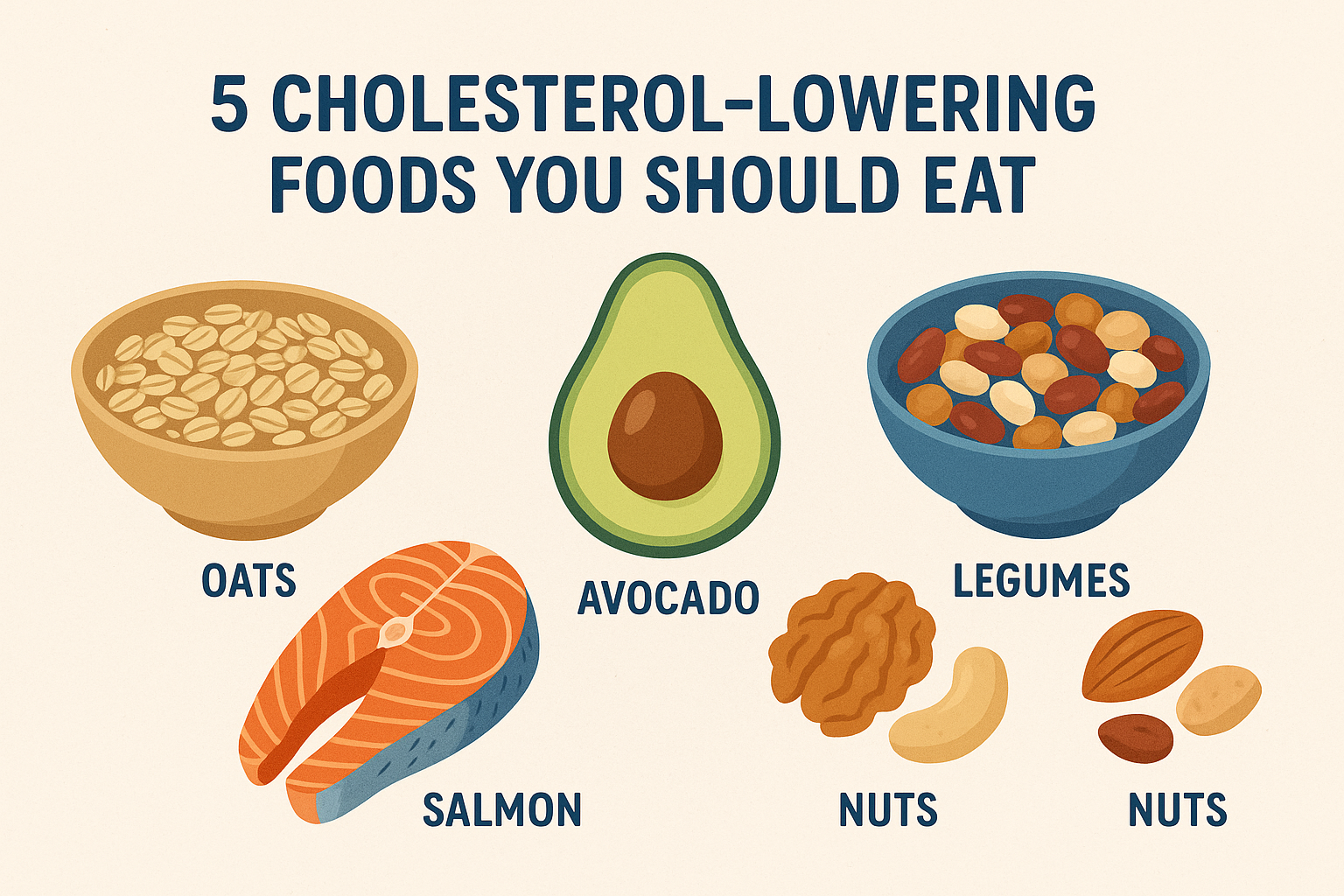High cholesterol is a significant risk factor for heart disease, and managing it often begins with what you put on your plate. While medications may help, your diet plays a powerful role in lowering bad cholesterol (LDL) and boosting good cholesterol (HDL). Some foods contain powerful cholesterol-lowering properties that support cardiovascular health naturally. Here are five cholesterol-lowering foods you should include in your daily diet to improve heart health and overall wellness.
Oats: The Morning Bowl That Fights Cholesterol
Oats are a powerhouse of soluble fiber, particularly a type called beta-glucan, which actively reduces the absorption of LDL cholesterol into the bloodstream. Just one to two servings of oats a day can lower your cholesterol levels by about 5 to 10%. A warm bowl of oatmeal for breakfast or adding oats to smoothies and baked goods can make a significant impact. Beta-glucan forms a gel-like substance in the gut that binds to cholesterol-rich bile acids and helps eliminate them from the body. This simple whole grain is not only effective but also affordable and easy to incorporate into your routine.
Fatty Fish: Omega-3 Rich Defense Against LDL
Fatty fish like salmon, mackerel, sardines, and tuna are rich in omega-3 fatty acids, which are known to reduce triglycerides and support heart health. Unlike saturated fats that increase cholesterol, omega-3s help lower the risk of heart disease by reducing inflammation and preventing plaque buildup in the arteries. Replacing red meat with fatty fish twice a week can significantly cut down bad cholesterol levels while increasing the protective HDL. Grilled or baked fish, rather than fried, ensures that you reap the full benefits of these heart-healthy fats.
Nuts: A Handful a Day for Heart Protection
Nuts such as almonds, walnuts, pistachios, and hazelnuts are loaded with monounsaturated fats, plant sterols, and fiber — all of which contribute to lowering cholesterol levels. Regular consumption of a small handful (about 30 grams) of unsalted nuts has been shown to reduce LDL cholesterol and improve the elasticity of blood vessels. Walnuts, in particular, are rich in omega-3 fatty acids, making them a double benefit for your heart. Though high in calories, nuts are nutrient-dense, so moderation is key to avoiding weight gain while still enjoying their cholesterol-lowering properties.
Legumes: Fiber-Rich Warriors Against Bad Cholesterol
Beans, lentils, chickpeas, and peas are excellent sources of soluble fiber and plant-based protein, both of which aid in reducing LDL cholesterol. The fiber binds to cholesterol in the digestive system, preventing it from being absorbed. Studies show that consuming just one cup of legumes per day can lower cholesterol levels and even assist in maintaining healthy blood sugar. Swapping meat for legumes in stews, soups, and salads a few times a week is a heart-smart move that supports a cholesterol-friendly diet.
Avocados: Creamy Fruit With Heart-Healthy Fats
Avocados are unique fruits rich in monounsaturated fats, which are proven to lower LDL cholesterol while boosting HDL. They also contain fiber and plant sterols, compounds known to block cholesterol absorption. Adding half an avocado a day to your meals — whether on toast, in salads, or blended into smoothies — can improve lipid profiles and contribute to overall cardiovascular health. Their creamy texture makes them a nutritious and satisfying substitute for saturated fat-rich spreads like butter or mayonnaise.
The Bottom Line: Small Changes, Big Impact
Incorporating these five cholesterol-lowering foods into your daily diet can lead to noticeable improvements in heart health over time. While no single food is a magic bullet, a consistent and balanced approach to eating — rich in fiber, healthy fats, and nutrient-dense options — is key to managing cholesterol naturally. Combined with regular physical activity and mindful lifestyle choices, these dietary habits can significantly reduce the risk of heart disease. It’s a reminder that with just a few thoughtful changes to what’s on your plate, you can take powerful steps toward a healthier heart and a longer, more vibrant life.

